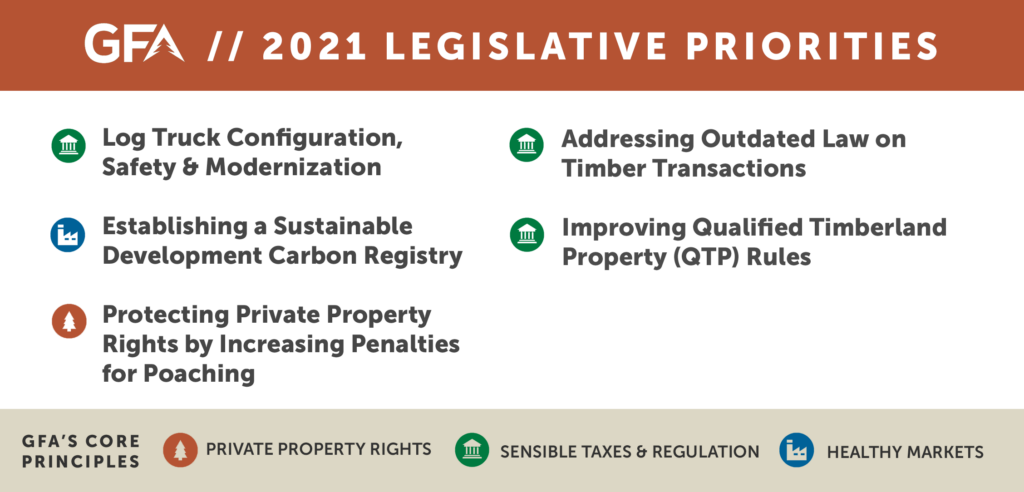On January 11, lawmakers from across the state returned to the Capitol to gavel in the first session of the 156th Georgia General Assembly. While this marked the first legislative day of the year, it represents the culmination of more than 18 months of preparation by the Georgia Forestry Association’s (GFA) Government Affairs Team and member committees to prepare a legislative strategy that focuses on protecting forestry investments, increasing efficiency of the forestry supply chain and promoting healthy markets for forest products.
“Georgia is the number one forestry state in the nation thanks to the leadership and key investments that have been made by our state’s forest landowners, forestry businesses and forest product manufacturers,” said Andres Villegas, President and CEO of the Georgia Forestry Association. “Our legislative strategy is aimed at protecting and enhancing those investments and the key ecological and economic benefits that working forests and forest products provide.”

Log Truck Configuration, Safety & Modernization
Efficiency of each part of the supply chain is key to enhancing the value of forestry investments and keeping Georgia’s forest industry competitive in domestic and global markets. GFA is supporting legislation focused on modernizing timber transportation in Georgia by creating an optional annual permit for hauling raw timber that would allow permit holders to haul at a greater gross vehicle weight so long as a sixth axle is added to the truck/trailer configuration. The legislation will seek to provide an option for timber hauling that is safer, less damaging to our roads and more efficient than Georgia’s current legal configuration.
“Simply stated, we want to create the conditions for Georgia to be the most competitive state in the U.S. South to safely haul timber,” said Villegas.
The Georgia Forestry Foundation funded research at the University of Georgia’s Warnell School of Forestry & Natural Resources to study the potential cost savings, payload gains and safety implications of a variety of log truck and weight configurations. Support this type of research by donating here.
Establishing a Sustainable Development Carbon Registry
Expanding the use of mass timber as a structural element in commercial construction will drive direct value for Georgia’s working forests while unlocking potential for working forests as a climate solution. GFA is developing legislation to establish the nation’s first carbon registry for sustainable buildings that will encourage developers to utilize wood products, including mass timber, and other materials that sequester carbon.
This effort, introduced as House Bill 1015 in 2020, passed the House last year with no opposition, but did not move in the Senate after the COVID epidemic upended the legislature’s work. GFA is engaged with a diverse coalition in support of this initiative, including the Georgia Chapter of The Nature Conservancy, the Georgia Conservancy and Southface.
Protecting Private Property Rights by Increasing Penalties for Poaching
Forest landowners depend on the annual non-timber revenue from hunting leases to offset their ad valorem tax liability each year and the costs of managing working forests. In order for those hunting leases to remain valuable it is critical that landowners can ensure the exclusivity of that land for their hunt clubs. Therefore, GFA is supporting the development of legislation to increase penalties on repeat poaching offenders while closing a loophole that allows poachers on private property of forest landowners to claim they are “hunting for arrowheads” despite being decked out in hunting gear and firearms.
Addressing Outdated Law on Timber Transactions
House Bill 90, is a bill jointly developed by GFA and the Georgia Bankers Association (GBA) to address an outdated 1939 law governing timber transactions that conflicts with the Uniform Commercial Code (UCC).
While in 1939, the forest industry was vertically integrated with mills primarily purchasing timber directly from forest landowners, today, mills primarily purchase already cut timber as a commodity good at their mill gates from loggers and wood dealers. Just as for purchasers of any other commodity goods or inventory goods, the UCC provides purchasers of cut timber protections as “buyers in the ordinary course of business” to purchase commodity logs free and clear of a security interest so long as they meet certain conditions set forth by the UCC such as the transaction being in good faith.
The purpose of this UCC protection is to facilitate transactions of commodity goods where a requirement to conduct a lien search on every commodity purchase would be extremely impractical and encumber business transactions. This is particularly the case in Georgia where there are approximately 2 million truckloads of timber that move in our state annually.
Improving Qualified Timberland Property Rules
In 2017-18, GFA worked to pass a constitutional amendment establishing the Qualified Timberland Property (QTP) program. This legislation created a new class of timberland property that was outside of CUVA or FLPA. The intent of the QTP program is to bring equity and fairness to how ad valorem taxes are assessed by empowering the Department of Revenue (DOR) to assess forestland rather than 159 different boards of assessors.
As currently drafted, GFA has identified several troubling areas in DOR’s proposed rules, particularly on qualification requirements for the program and application of highest and best use doctrine in the appraisal methodology utilized. GFA is developing legislation that is focused on ensuring legislative intent is adhered to in DOR’s rulemaking process for how timber value is assessed and what steps applicants have to take to enroll their land.


